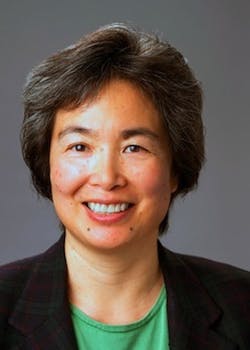Intel Adds Tsu-Jae King Liu, Taking Step Toward Board Diversity
Facing criticism over its largely white male workforce, Intel has found a board member who adds diversity to its executive ranks, while satisfying its deep-rooted culture of meritocracy.
On Tuesday, the chipmaker said that Tsu-Jae King Liu, one of the engineers who helped develop multigate FinFET transistors, was joining its board of directors. She is an electrical engineering professor and associate dean for academic planning at the University of California, Berkeley College of Engineering.
Liu, 53, is now the second woman serving on Intel’s board and the only woman with an engineering background. The other female board member is Charlene Barshefsky, the former United States Trade Representative, who was elected to the position in 2004. No directors were displaced by the appointment, which brings the board to 11 members.
Intel has been under pressure from civil rights groups to increase diversity to its engineering staff and executive management. Adding to the scrutiny of its workforce, Intel has set concrete goals for hiring women and underrepresented minorities, tracking progress with an annual diversity report. The company has vowed to achieve “full representation” by 2020, making its workforce more representative of the U.S. population.
In 2015, Intel said that it had increased diversity hires by 43.1% over the previous year, at the same time increasing the number of female managers from 14.3% to 17.6%. Despite this progress, the chipmaker has struggled to change the composition of its engineering staff. Only 20.1% of its engineers are female, and nearly 87% are either white or Asian.
Though it still needs improvement, Intel has been praised for its transparency and commitment to diversity. Many technology companies, including Apple and Google, have released diversity statistics without setting hard goals. Early last year, Intel said that it was investing $300 million to hire underrepresented workers and fund student programs that build a more diverse pipeline of engineers.
In recent years, the board of directors has received few changes toward diversity. Liu arrived in the wake of two other female board departures. Jane Shaw, former chief executive of Aerogen, retired in 2012; Susan Decker, former president of Yahoo, served until May. The board includes nine male members. There are no Latinos or African-Americans on the board.
The last appointment to the board was Aneel Bhusri, chief executive officer at cloud computing company Workday, and the son of an Indian immigrant to the United States. He was elected in 2014.
Liu’s appointment breaks with the composition of chip industry boards, which are disproportionately white and male. In 2014, the boards of Silicon Valley technology companies were only 18.3% female, according to research firm Equilar, which gathers data on corporate management.
Female engineers in management positions are still rare compared to other industries, because engineers typically slide into senior positions after years of technical work. The process holds back female engineers, who are not only entering the field in smaller numbers but also leave the profession more frequently. With lower odds of advancement and fewer female mentors, nearly one out of every four women will leave the profession, according to studies by the Society of Women Engineers.
Liu’s appointment marks another break with technology boards, where women are more likely to have business backgrounds. Her expertise is in making smaller and cheaper transistors, the building blocks of microprocessors—a practice that Intel elevated to the status of law. The multigate FinFET, which Liu developed with Chenming Hu and Jeff Bokor in 1999, cleared the way for transistors smaller than 20 nanometers.
The majority of Liu’s career has been spent at universities, but she also held positions at Silicon Valley institutions like the Palo Alto Research Center and circuit design toolmaker Synopsys. With more than 90 patents, Liu continues to study nanometer-scale logic and memory devices, as well as advanced materials and energy-efficient electronics.
“She brings a wealth of expertise in silicon technology and innovation that will be valuable for Intel in many areas as we navigate a significant business transition while continuing to lead in advancing Moore’s Law,” said Intel chairman Andy Bryant in a statement.
About the Author
James Morra
Senior Editor
James Morra is the senior editor for Electronic Design, covering the semiconductor industry and new technology trends, with a focus on power electronics and power management. He also reports on the business behind electrical engineering, including the electronics supply chain. He joined Electronic Design in 2015 and is based in Chicago, Illinois.



